八年级英语上册《Unit 6 Period 5 Grammar 1》导学案 牛津版
- 格式:doc
- 大小:15.50 KB
- 文档页数:4
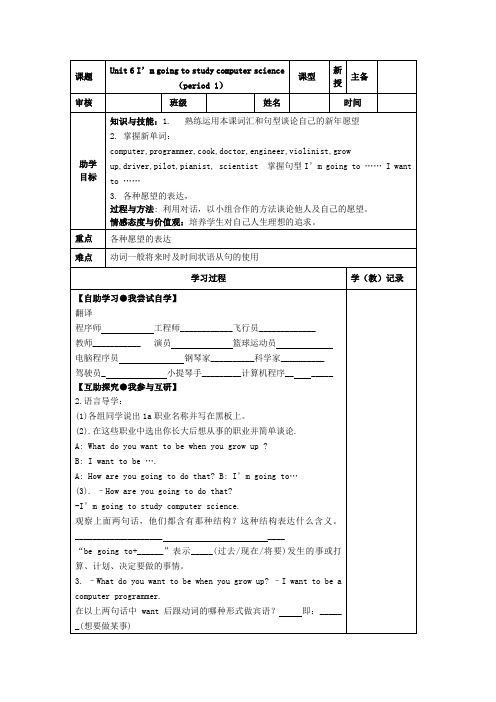
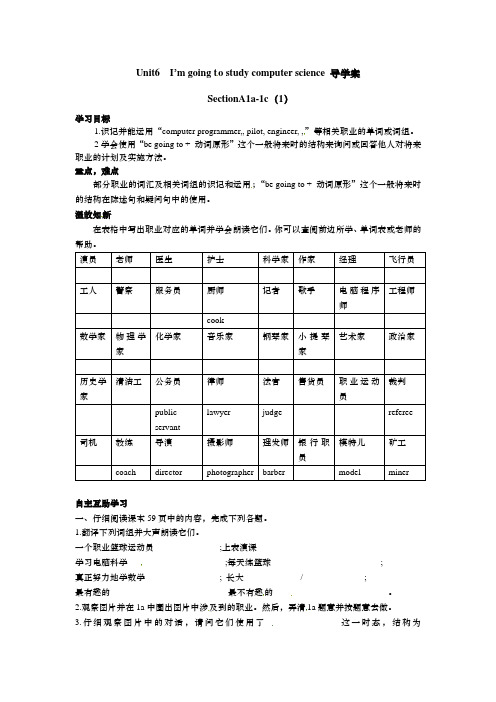
Unit6 I’m going to study computer science 导学案SectionA1a-1c(1)学习目标1.识记并能运用“computer programmer,, pilot, engineer, ,”等相关职业的单词或词组。
2学会使用“be going to + 动词原形”这个一般将来时的结构来询问或回答他人对将来职业的计划及实施方法。
重点,难点部分职业的词汇及相关词组的识记和运用;“be going to + 动词原形”这个一般将来时的结构在陈述句和疑问句中的使用。
温故知新在表格中写出职业对应的单词并学会朗读它们。
你可以查阅前边所学、单词表或老师的帮助。
自主互助学习一、仔细阅读课本59页中的内容,完成下列各题。
1.翻译下列词组并大声朗读它们。
一个职业篮球运动员_______________;上表演课__________学习电脑科学______________________;每天练篮球_________________________;真正努力地学数学_________________; 长大_____________/______________;最有趣的___________________________最不有趣的__________________________。
2.观察图片并在1a中圈出图片中涉及到的职业。
然后,弄清1a题意并按题意去做。
3.仔细观察图片中的对话,请问它们使用了________________这一时态,结构为______________________________。
在对话中能找到“when you are older”这个句子的同义句吗?若能,它是___________________________。
最后,背诵此对话。
二、听力。
1.弄清题意并按照题意听磁带。
2.小组内核对答案。
课堂练习1.依据1b中的信息,效仿1c中的对话制作属于你们自己的对话。

第6单元I’m going to study computer science.Section A 单词cook n.厨师v.烹饪;煮doctor n.医生engineer n.工程师violinist n.小提琴手driver n.驾驶员;司机pilot n.飞行员pianist n.钢琴家scientist n.科学家college n.学院;大学;高等专科学校education n.教育medicine n.药;医学university n.(综合性)大学;高等学府London 伦敦article n.文章;论文send v.邮寄;发送短语grow up长大;成熟;成长computer programmer计算机程序设计员be sure about确信;对……有把握make sure确保;查明句型1. What do you want to be when you grow up ? 长大以后你想做什么?2. I’m going to practice basketball every day.我打算每天练习(打)篮球。
3. I’m going to start when I finish high school and college.我打算上完高中和大学后开始。
Section B 单词team n.队;组foreign adj.外国的able adj.能够promise n.承诺;诺言v.许诺;承诺beginning n.开头;开端improve v.改进;改善physical adj.身体的meaning n.意义;意思discuss v.讨论;商量hobby n.业余爱好paint v.用颜料画;在……上刷油漆weekly adj.&adv.每周的(地)schoolwork n.学校作业;功课question v.表示疑问;怀疑;提问;质询themselves pron.他(她、它)们自己own adj.&pron.自己的;本人的personal adj.个人的;私人的relationship n.关系;联系resolution n.决心;决定self improvement n.自我改进;自我提高短语be able to 能够做某事at the beginning of 在……开始write down写下;记录下have to do with 关于;与……有关系make promises许下承诺take up (尤指为消遣)学着做;开始做hardly ever几乎不;很少too…to…太……而不能……;太……以至于不能句型1. When we make resolutions at the beginning of the year, we hope that we are going to improve our lives. 当我们在新年伊始下决心的时候,我们希望能够改善我们的生活。
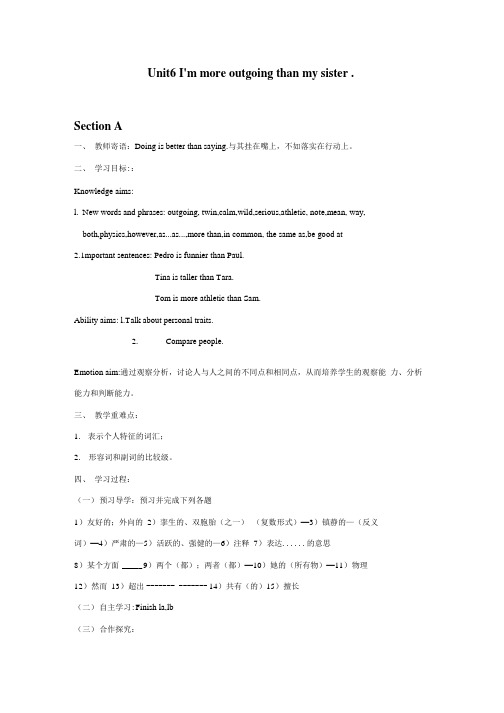
Unit6 I'm more outgoing than my sister .Section A一、教师寄语:Doing is better than saying.与其挂在嘴上,不如落实在行动上。
二、学习目标::Knowledge aims:l.New words and phrases: outgoing, twin,calm,wild,serious,athletic, note,mean, way,both,physics,however,as...as...,more than,in common, the same as,be good at2.1mportant sentences: Pedro is funnier than Paul.Tina is taller than Tara.Tom is more athletic than Sam.Ability aims: l.Talk about personal traits.pare people.Emotion aim:通过观察分析,讨论人与人之间的不同点和相同点,从而培养学生的观察能力、分析能力和判断能力。
三、教学重难点:1.表示个人特征的词汇;2.形容词和副词的比较级。
四、学习过程:(一)预习导学:预习并完成下列各题1)友好的;外向的2)挛生的、双胞胎(之一)(复数形式)—3)镇静的—(反义词)—4)严肃的—5)活跃的、强健的—6)注释7)表达......的意思8)某个方面_____ 9)两个(都);两者(都)—10)她的(所有物)—11)物理12)然而13)超出------- ------- 14)共有(的)15)擅长(二)自主学习:Finish la,lb(三)合作探究:1.形容词和副词的比较级的变化规则和用法。
形容词比较级的变化规则(1)规则变化:%1一般地直接在词尾加一er(以e结尾的,只加一r)otall—taller quiet—quieter%1以“辅音字母+y”结尾的单词,变y为i,再加一er。
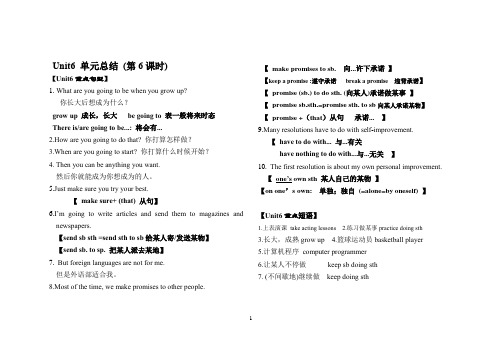
Unit6 单元总结(第6课时)【Unit6重点句型】1.What are you going to be when you grow up?你长大后想成为什么?grow up 成长,长大be going to 表一般将来时态There is/are going to be...: 将会有...2.How are you going to do that? 你打算怎样做?3.When are you going to start? 你打算什么时候开始?4. Then you can be anything you want.然后你就能成为你想成为的人。
5.Just make sure you try your best.【make sure+ (that) 从句】6.I’m going to write articles and send them to magazines and newspapers.【send sb sth =send sth to sb给某人寄/发送某物】【send sb. to sp. 把某人派去某地】7.But foreign languages are not for me.但是外语部适合我。
8.Most of the time, we make promises to other people.【make promises to sb. 向...许下承诺】【keep a promise :遵守承诺break a promise 违背承诺】【promise (sb.) to do sth. (向某人)承诺做某事】【promise sb.sth.=promise sth. to sb向某人承诺某物】【promise +(that)从句承诺... 】9.Many resolutions have to do with self-improvement.【have to do with... 与...有关have nothing to do with...与...无关】10.The first resolution is about my own personal improvement.【one’s own sth 某人自己的某物】【on one’s own: 单独;独自(=alone=by oneself) 】【Unit6重点短语】1.上表演课take acting lessons2.练习做某事practice doing sth3.长大,成熟grow up4.篮球运动员basketball player5.计算机程序computer programmer6.让某人不停做keep sb doing sth7. (不间歇地)继续做keep doing sth18. (间歇后)继续做keep on doing sth9.一定会做某事be sure to do sth10.对...有把握be sure about/of sth 11.确保,查明make sure 12.确切地;肯定地for syre 13.把某人派去某地send sb to sp 14给某人寄/发送某物send sb sth =send sth to sb15搬到某地move to sp 16.外语foreign languages17. 新年决心New Year’s resolutions18.学习做某事learn to do sth 19.取得好成绩get good grades 20.做大量运动get lots of exercise21组建足球队make a soccer team22听起来像... sound like 23.听起来... Sound+adj.24.向某人许诺make promises to sb.25.(向某人)承诺做某事promise sb to do sth26.向某人承诺某物promise sb sth =promise sth to sb27.能做某事be able to do sth 28.从某地回来get back from sp 29.下决心make resolutions 30....的意思the meaning of...31.在...的开始at the beginning of...32.写下write down 33.身体健康physical health 34.同意,赞成agree with35.与...有关have to do with...36.与...无关have nothing to do with37.开始做某事(尤指兴趣)take up doing sth38.忘记某事forget about sth 39.正是这个原因for this reason40.某人自己的某物one’s own sth41.单独;独自on one’s own=alone=by oneself.【Unit6单元练习】Ⅰ.单项选择。
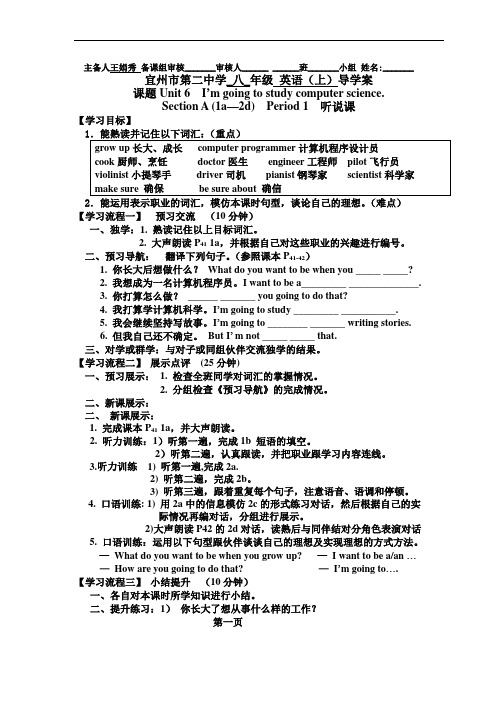
主备人王娟秀备课组审核_______审核人______ ______班_______小组姓名:_______ 宜州市第二中学_八_年级英语(上)导学案课题Unit 6 I’m going to study computer science.Section A (1a—2d) Period 1 听说课【学习目标】2.能运用表示职业的词汇,模仿本课时句型,谈论自己的理想。
(难点)【学习流程一】预习交流(10分钟)一、独学:1. 熟读记住以上目标词汇。
2. 大声朗读P41 1a,并根据自己对这些职业的兴趣进行编号。
二、预习导航:翻译下列句子。
(参照课本P41-42)1. 你长大后想做什么?What do you want to be when you _____ _____?2. 我想成为一名计算机程序员。
I want to be a_________ ______________.3. 你打算怎么做?______ _______ you going to do that?4. 我打算学计算机科学。
I’m going to study _________ ___________.5. 我会继续坚持写故事。
I’m going to ________ _______ writing stories.6. 但我自己还不确定。
But I’ m not _____ _____ that.三、对学或群学:与对子或同组伙伴交流独学的结果。
【学习流程二】展示点评(25分钟)一、预习展示: 1. 检查全班同学对词汇的掌握情况。
2. 分组检查《预习导航》的完成情况。
二、新课展示:二、新课展示:1. 完成课本P41 1a,并大声朗读。
2. 听力训练:1)听第一遍,完成1b 短语的填空。
2)听第二遍,认真跟读,并把职业跟学习内容连线。
3.听力训练1) 听第一遍,完成2a.2) 听第二遍,完成2b。
3) 听第三遍,跟着重复每个句子,注意语音、语调和停顿。
高邮市初中英语导学案(9A Unit 6 Grammar 1)班级:姓名:自我评价:【学习目标】1.知识目标:用间接引语谈论其他人说的话。
2. 技能目标: 用间接引语来转述问题。
3.情感目标: 用恰当的语言来谈论罪行、嫌疑犯、无辜和有罪。
学习过程【预习指导与检测】一、预习导读(语法盘点)(1)当我们引用别人的话时,可以用别人的原话,也可以用自己的话把意思转述出来,如果是引用原话,被引用的部分就称为直接引语,如果是转述,就称为间接引语。
如:The detective asked: “Who knows the victim?”其中的“Who knows the victim?”就是直接引语。
The detective asked who knew the victim.其中的who knew the victim就是间接引语。
直接引语通常用引号(“”)括起来,间接引语在多数情况下都可构成一个宾语从句。
(2)如果主句是过去时态,直接引语变间接引语时时态作如下变化。
1、一般现在时改为一般过去时The witness said “I‟m scared.”The witness said (that) he was scared.2、现在进行时改为过去进行时“I‟m doing my homework,” said she.She said (that) she was doing her homework.3、现在完成时改为过去完成时Tom said, “I‟ve received the letter.”Tom said (that) he had received the letter.4、一般过去时改为过去完成时“I didn‟t see the cat,” said he.He said (that) he hadn‟t seen the cat.5、一般将来时改为过去将来时(would + v.)“We‟ll look for more clues,” said Detective Lu.Detective Lu said (that) they would look for more clues.(3)直接引语变间接引语除了考虑时态的变化外,还要注意以下五方面的变化。
八年级英语上册unit6全单元导学案(人教新目标)人教新目标英语八年级上册Unit 6 I’m going to study computer science.Section A1a---2c【学习目标】掌握以下知识点1. 记忆本课时单词及其短语2. 熟练运用句型-What are you going to be……?-I'm going to be ……谈论将来意向,运用句型-How are you going……?--I'm going to …….谈论实现方式。
【学习重点】. 动词一般将来时的使用【前测】自学与小组讨论自主学习翻译下列单词及短语。
1. cook n ; cook v 做一顿饭2. doctor n 看医生3. engineer n 两位工程师4. violin n violinist n 拉小提琴5. drive v driver n 开一辆小轿车6. pilot n7. piano n pianist n 弹钢琴8. science n scientist n9. be sure about10. grow up make sure11. computer programmer actor n12. teacher n teach v _________13. basketball player14. 学习计算机科学________ ________ _________15. 每天练习篮球__________ __________ _______ ________16. 努力学习数学______ _________ __________ __________17. 学习(上)表演课程_______ ________ ____________【课堂1+1】:小组讨论和小组展示1+1Task1. 探究学习学习谈论将来意向及实现方式1、记忆并练习下列对话:-What are you going to be when you grow up?-I'm going to be a basketball player.-How are you going to do that?-I'm going to practice basketball every day..“be going to+动词原形"表示计划、打算要做或即将发生的事,be动词有人称和数的变化。
八年级上英语Unit 6. I’m going to study computer science. (Period 1)编制人: 审核人:【学习目标】1.能掌握以下单词:grow up, computer programmer, cook, doctor, engineer, violinist, driver, pilot, pianist, scientist, be sure about, make sure2. 能掌握以下句型:①─What do you want to be whe n you grow up?②─How are you going to do that? ─I’m going to practice basketball every day.③ Where are you going to work? ④ When are you going to start?3. 能了解以下语法:一般将来时态的构成形式及用一般将来时态表达将要做的事情。
4. 每个人都有自己的梦想和对未来的打算,对于将来想要从事的职业也充满了憧憬。
【学习重难点】1.学习一般将来时态的构成方式。
2.学习本课时出现的重点句型,通过在不同情景下运用来熟练运用一般将来时态。
【使用说明与方法指导】:1. 预习第六单元前20个单词,为听说训练排除障碍。
2. 预习2d对话,用红笔勾画出重点短语和句型,标出疑问,完成导学案上的练习题。
【预习案】自学任务1:个人默读P41&P126的单词和短语,并进行记忆,然后关上书本,看音标或中文写出以下单词或短语:/ 'dɒktə(r) / ________ / 'draɪvə(r) /__________ / kʊk / _______/ 'paɪlət / __________ / ˈsaɪəntɪst /_________ / ˌendʒɪ'nɪə/ _____________/ˌvaɪəˈlɪnɪst /_________ / ˈpɪənɪst / __________ / ˈprəʊgræmə(r)/_______________ 编程人员__________________确保______________对…有把握________________ 为了实现不同的梦想,你们打算怎么做呢?请你们翻译以下词组:I’m going to ...①努力学习数学________________ ②每天训练篮球_____________________ ③上表演课_____________________ ④上烹饪学校______________________ ⑤坚持写日记___________________ ⑥每天训练弹钢琴___________________ 自学任务2:Read P42 2d carefully and answer the questions:1. What does Ken want to be? _______________________________________________2. How is he going to do that? _______________________________________________3. What does Andy want to be? ______________________________________________4. What does Andy’s parents want her to be? ____________________________________ 【探究案】课堂任务1:Brainstorm:写出你知道的表示职业的名词:(10个以上)______________________________________________________________________________________________________________________________________________课堂任务2:pair work:阅读P41 1c的对话,根据你自己的实际情况进行对话:What do you want to be when you grow up?I want to be a / an _____________.How are you going to do that?I’m going to ____________________________________________.【训练案】一、单项选择()1.—What is Nancy going to be when she____?—Maybe she is going to be a math teacher.A. growB. growsC. grow upD. grows up()2.Joy is going to practice ___ the piano next weekend.A. playB. to playC. playingD. plays()3. He is going to _____ a waiter in the restaurant.A. doB. beC. workD. is()4.________ going to do that?A. What are youB. How do youC. How are youD. What do you()5.—How are you going to be a computer programmer? —I’m going to _______.A. take piano lessonsB. keep fitC. eat healthy foodD. study computer science二、根据汉语意思完成英语句子。
人教版八年级英语上册导学案Unit 6 I’m going to study computer science.第1课时 Section A (1a-2c)一、学习目标(一)知识目标1. 口、笔头掌握以下句型:A: What do you want to be when you grow up? B: I’m going to be a computer programmer.A: How are you going to do that?B: I’m going to study computer science.A: What does Cheng Han want to be?B: He wants to be…2. 熟练掌握以下词汇:grow up, computer programmer, cook, doctor, engineer, violinist, driver, pilot, pianist, scientist3. 正确使用when 引导的时间状语从句,并能用be going to 结构对将来的事做出计划。
(二)技能目标能听懂用be going to结构谈论自己及他人理想职业的对话,并能用这种结构进行相关话题的会话。
二、情感态度通过谈论将来的计划打算和怎样实现这一目标,引导学生思考自己的人生目标,及早为将来做准备,树立正确的人生观。
三、课前准备I. 你熟悉下列人物吗?通过学习,试着写出他们职业的英文表达方式。
Yang Liwei: _____________ Jackie Chen: ______________Jay Chou: _____________ Yao Ming: ______________II. 回忆并写出我们学过的有关职业的英文表达方式:___________________________________你知道更多的职业的英文表达方式吗?查资料写下来与同伴分享吧(可参考41页的1a)四、学习过程Before listening1. 1a各组同学说出职业名称并写在黑板上。
八年级英语上册《Unit 6 Period 5
Grammar 1》导学案牛津版
Grammar1》导学案(无答案)牛津版Step2新课导学语法简介:过去进行时态(一)构成was (were)
+ 动词-ing构成。
(二)
形式过去进行时的肯定式:I was working、 / You were working、 / He/She/It was working、We/You/They were working、过去进行时的否定式:I was not working、 / You were not working、 / He/She/It was not working、We / You / They were not working、过去进行时的疑问式:Were you working at ten last night? Yes, I was、/ No, I wasn’t、Was he working at ten last night? Yes, he was、 / No, he wasn’t、(三)用法:过去进行时的意义:表示过去正在发生或进行着的动作。
例如:You were listening to me、 / They were learning English、What were you doing?He was watching TV 、过去进行时的用法:表示在过去某一时刻或某一时间正在进行的动作。
这一特定的过去时间,除了有上下文暗示以外,一般用时间状语来表示。
When were you doing this time yesterday?--We were working in class、He was mending his bike at ten o’clock yesterday、I was drawing a horse
when the teacher came in、While she was trying to pass a truck before her, she saw another car coming、2、学习了过去进行时的语法,快来完成99---100页A1和A2部分的练习吧。
做完之后,两人一组朗读对话,并核对答案。
注意过去进行时的构成哦。
3、聪明的你能将A2 的对话改写成一段小故事吗?快来显示你的文采吧!Step3 自我评价一:用所给动词的正确形式填空:
1、Look! Some children ____________(chat)、
2、Sorry,
I ________(help)
the baby tie the shoelace at present、3、 Some children ___________(chat)
this time yesterday、4、 Sorry, I _________(help)
the baby tie the shoelace at that time、5、 I
_______________(wash)
my face at6 this morning、6、 She _____still
______(lie)
in bed this time yesterday、7、 _____you
____________(watch)
TV from seven to nine yesterday evening、8、 He
______________(drink)
tea the whole morning、二、按要求转换下列句型。
1、We were having a PE class at four yesterday afternoon、(改为否定句)We ______ ______ a PE class at four yesterday afternoon、
2、 Kate was reviewing her lessons at eight last night、(改为一般疑问句,并做肯、否定回答)________ Kate _______her lessons at eight last night?________ , she ________、 ________ , she _______ 、
3、 He ran in the park、(用at this time yesterday改写)He _______ ________in the park at this time yesterday、
4、 They were playing computer games at nine last night、(对划线部分提问)________ ________ they _______ at nine last night? 三
选择填空
1、My brother ___ while he ___ his bicycle and hurt himself、
A、 fell, was riding
B、 fell, were riding
C、 had fallen, rode
D、 had fallen, was riding
2、I first met Lisa three years ago、 She ___ at a radio shop at the time、
A、 has worked
B、 was working
C、 had been working
D、 had worked
3、 The reporter said that the UFO ___ east to west when he saw it、
A、 was traveling
B、 traveled
C、 had been traveling
D、 was to travel
4、 I ___ my breakfast when the morning post came、
A、 had
B、 had been having
C、 have been having
D、 was having
5、When I arrived at his office, he ___ on the phone、
A、 was speaking
B、 spoke
C、 had been speaking
D、 had spoken四,根据汉语提示,完成下列句子,每空填一词。